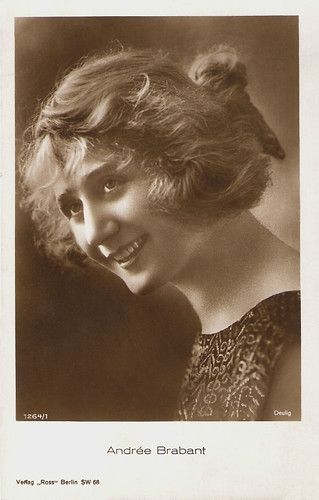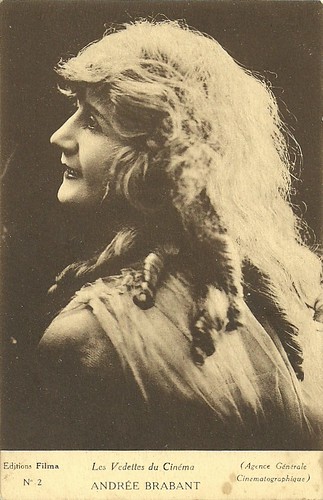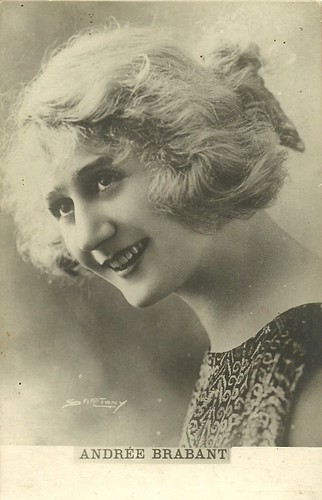
German postcard by Ross Verlag, no. 1264/1, 1927-1928. Photo: Deulig.
Charming new dancer
Marie Thérèse Andrée Brabant was born in Reims, France, in 1901. Shortly after her birth, she was placed in the custody of her grandmother before returning at the age of four to her father, a railway employee, and her mother, a housewife. Ten years later, after the infidelity of her father, her parents separated. She followed her mother to Paris where she quickly found work as a shorthand typist. Shortly afterwards, Andrée met the ballet master of the Mayol concerts and was engaged by Félix Mayol himself to be a dancer in his revues.
In 1916 film director Abel Gance was looking for a young artist for his next film, Le Droit à la vie/The Right to Life (Abel Gance, 1916), when one of his friends advised him to go and see the new dancer at Mayol’s. The filmmaker fell for her charm and he immediately offered her the female lead role opposite Paul Vermoyal and Léon Mathot.
Andrée Brabant left the stage to fully devote herself to cinema. The following year Abel Gance used her again as the protagonist in La zone de la mort/The Zone of Death (Abel Gance, 1917), again with Léon Mathot. She also acted in André Antoine’s Les travailleurs de la mer/Workers of the Sea (1917), adapted from Victor Hugo and starring Romuald Joubé. For twelve years, the beautiful young actress, still chaperoned by her mother, performed in about twenty productions that would make her a real star. Her best films include La cigarette/Cigarette (Germaine Dulac, 1919), La maison vide/The Empty House (Raymond Bernard 1921), and Le rêve/The Dream (Jacques de Baroncelli, 1921), an adaptation of Emile Zola.
In La cigarette/Cigarette (Germaine Dulac, 1919), Andrée Brabant played the wife of a museum director (Gabriel Signoret) who suspects his wife of infidelity and places a poisoned cigarette in the box on his desk, allowing fate to strike. In La maison vide/The Empty House (Raymond Bernard 1921), she is a young typist hired by an old entomologist (Henri Debain), who is fascinated with her, while two industrialists (Pierre Alcover, Jacques Roussel) try to conquer her. She instead favours a young clerk, so her employer is left alone in his empty house.
In Le rêve/The Dream (Jacques de Baroncelli, 1921) she is a foundling gathered under a porch of a cathedral. As an adult, she suffers from a bishop (Gabriel Signoret) who opposes his son’s marriage with her. When he finally consents she dies during her wedding at the place where she was found. Andrée Brabant also appeared in two serials of quality, Travail/Work (1919) by Henri Pouctal and Tao, le fantôme noir/Tao, the black ghost (Gaston Ravel, 1923), starring Joë Hamman.

French postcard by Editions Filma in Les Vedettes du Cinéma series, no. 2. Photo: Agence Générale Cinématographique.

French (?) postcard. Photo: Sartony.
A sumptuous life
Andrée Brabant starred in Les ombres qui passent/The Shadows That Pass (Alexandre Volkoff, 1924) opposite the great Russian actor Ivan Mozzhukhin with whom she had a brief liaison. She plays the wife of Mozzhukhin who is caught in a net of swindlers led by femme fatale Nathalie Lissenko.
Brabant also starred in Le mariage de Mademoiselle Beulemans/The Marriage of Mademoiselle Beulemans (1927), one of the very first films of Julien Duvivier. In this romantic comedy, based on a classic play by Jean François Fonson and Fernand Wicheler, she is a Belgian brewer’s daughter who is betrothed to a local (René Lefevre), but loves a Parisian classy man (Jean Dehelly). Then the daughter finds out her fiancé secretly already has a wife and kid. At that time, Andrée Brabant led a sumptuous life, bought a mansion in Neuilly-sur-Seine, which was soon called the Hotel Brabant, and accumulated amorous adventures, some of them illustrious, e.g. with King Fouad 1er Of Egypt and the President of the Republic Paul Deschanel. She never married and never had a child, a sacrifice for her career that she would accept without regret for the rest of her life.
In 1929, Brabant played in her first sound film, Maternité/Maternity by Jean Benoît-Lévy, but she made the mistake of believing that this new Art was not made for her. The star honoured the few film contracts in progress, such as the excellent silent drama Au bonheur des dames (Julien Duvivier, 1929) with Dita Parlo. Then she left the film industry to play comedy at the Grand-Guignol theatre to prove to her audience that she did not need cinema to know how to speak.
But, with the arrival of sound film, competition became rough and the salaries less and less. When she tried to return to the cinema, she only found a few small parts, such as in Le feu de paille/Hay Fever (Jean Benoît-Lévy, 1939), starring Lucien Baroux and Orane Demazis. Andrée separated herself little by little from all of her jewellery, and then from all her possessions, including her mansion. Nevertheless, she remained active at the Grand Guignol until the end of the Second World War.
After the Liberation, Andrée Brabant went to live with her mother in Marseille. After the death of the latter and without resources, she became a demonstrator in household appliances for Brandt and travelled for her job all over France and North Africa. At the age of retirement, she settled in Belgentier in the Var region. In 1964 Jean-Christophe Averty made for his TV documentary series Trente ans de silence one episode with and on Brabant. In 1964, she also played her last film role in L'âge ingrat/The Ungrateful Age (Gilles Grangier, 1964) with Fernandel and Jean Gabin, after which the old actress inexorably sank into oblivion.
Andrée Brabant died in 1989 in Toulon, France, in total anonymity. She was 88. All in all, she had acted in some 35 films.
Scenes from Au bonheur des dames (Julien Duvivier, 1929) with Dita Parlo. Source: Radio Santos (YouTube).
Sources: Pascal Donald (CineArtistes), Unifrance, Wikipedia (French and English) and IMDb.
This post was last updated on 29 July 2023.
No comments:
Post a Comment